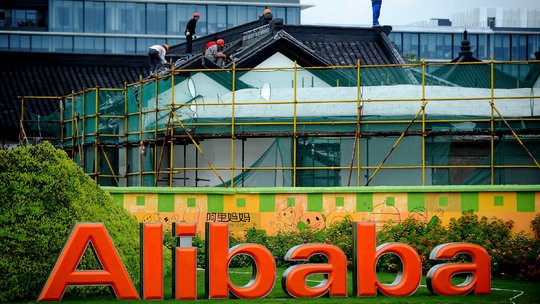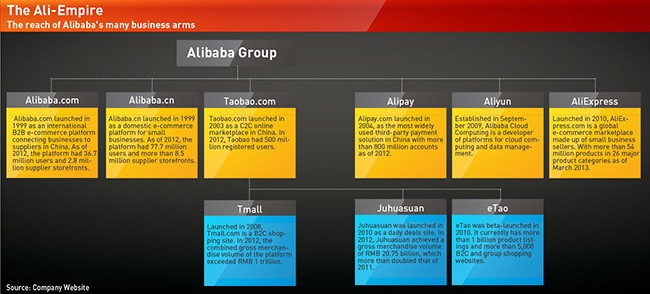Alibaba leads the charge for China s internet expansion overseas
Post on: 16 Март, 2015 No Comment

Perched on stage beside the hulking figure of Arnold Schwarzenegger last weekend, Alibaba boss, Jack Ma, looked slighter than ever. But the entrepreneur did not need the Californian governor’s tips on keeping lean and building muscle. In just over a decade, he has turned a tiny startup into an online titan.
Previous star turns at the two-day AliFest – the firm’s annual celebratory rally in its eastern Chinese home of Hangzhou – have included the former US president Bill Clinton, micro-credit pioneer Muhammad Yunus and the basketball star Kobe Bryant. Such high-profile guests not only signal Alibaba’s achievements but highlight its ambitions for the future. Having triumphed in the Chinese market, its sights are set on the world, beginning with the US, India and Japan.
In recent months, Alibaba has made its first two US acquisitions, Vendio and Auctiva. It is pushing to expand its overseas presence with AliExpress, its new online marketplace, and executives said they would be happy to buy back Yahoo’s 40% stake in the group (although they are currently engaged in a spat. Analysts see little prospect of this for now: the group is Yahoo’s foothold in China and has helped hold up its share price).
Alibaba is extremely ambitious and they want to champion China’s outbound growth, said Duncan Clark, chairman of the consultancy BDA China. You’ve got the first wave of natural resource companies; the second wave of manufacturing, moving into hi-tech with companies like Huawei. Now the big question is: can Chinese companies prosper and operate in managing businesses overseas and targeting overseas consumers? They’re going to have a crack at it and they’re encouraged by the government to do so.
Alibaba may be better positioned than most. Overseas experience? Check – its original site, alibaba.com. connects foreign businesses to Chinese suppliers. A visionary boss with a flair for publicity? Check – Ma, a puckish former teacher, has the profile of a cooler Sir Richard Branson. Deep pockets? Check – alibaba.com’s 2007 flotation netted $1.5bn and Japan’s Softbank has provided additional investment.
Like other Chinese internet companies, Alibaba has already trounced a US giant at home; cultural differences and government policy have left the west’s household names as also-rans, has-beens or never-weres on the Chinese mainland. Baidu and Tencent run things here, not Google or Amazon.
When eBay bought a leading local customer-to-customer site in 2003, Ma took the fight to them by setting up a rival service, Taobao – not only free to users but carefully tailored to China in everything from its colour scheme to the creation of an escrow system to counter widespread fears of being cheated.
Within two years, eBay had in effect withdrawn; the joint venture it later launched with the Chinese firm Tom Online is now said to have a single-digit share of the market.
Success at home
Meanwhile, Taobao boasts it has more than 190 million registered users and the research firm Analysys estimates it has more than 75% of the consumer-to-consumer market, with online transactions of 88.2bn yuan (8.5bn) in the second quarter of this year.
The same firm estimated Alibaba controls more than 73% of the domestic business-to-business market by income. Its grasp of the export market is such that it now makes quarterly reports to the Chinese government.
With the world’s largest internet population – 400 million and rising – there is plenty of room for growth. Last month, Deutsche Bank forecast China would handle more than 1.5 trillion yuan in online transactions by 2014, due to annual growth rates of 42%.
Whether Alibaba can thrive abroad is another matter. [Chinese firms] have understood the Chinese users much better than foreign companies, said Mark Natkin, managing director of the Beijing-based Marbridge Consulting. That’s not really an advantage once you go overseas.
This knowledge gap appears to explain the improbable appearance of eBay’s chief executive, John Donahoe, at AliFest this year.
We are competitors in some ways but we have the same dream, the same mission and the same goal to help entrepreneurs, Ma said. I believe one day we will work very closely together.
The companies announced they were exploring further collaboration; already, the online PayPal system owned by eBay is in use on AliExpress.

Alibaba aims to create a seamless chain of online transactions between suppliers, retailers and consumers. But outside China the last link between retailers and customers is likely to come through others, such as eBay, alibaba.com’s chief executive, David Wei, said in an interview.
Strategic deals could help Alibaba to grow outside its comfort zone, and aid eBay as it struggles to fight off Amazon. Yet analysts identify potential for future conflict.
We think Alibaba and eBay are moving into each other’s territory, as eBay helps China manufacturers sell directly on eBay, and Alibaba develops relationships with US online merchants. The two are effectively ‘frenemies’, with eBay at the western end of a supply chain and reaching east, and Alibaba at the eastern end and expanding west, wrote James Mitchell and Lisa Yuan of Goldman Sachs in a note last month.
They said Alibaba’s acquisitions of Auctiva and Vendio provide tools for about 250,000 sellers who together account for about a quarter of eBay’s business. Those firms could one day encourage merchant partners to list products on a rival platform.
Wei insists AliExpress is a wholesale service that aims to streamline sourcing and reach smaller retailers. Alibaba.com helps firms to find suppliers whereas AliExpress enables them to buy online. Yet, with no minimum order controls, it has obvious appeal to individual bargain hunters. You can buy a single memory card reader for 30 cents, plastic Halloween lanterns for 80 cents or a pair of platform shoes for under $10 – all with free shipping. The homepage boasts that it offers small orders … from just one item.
This kind of activity … is not what we are designed for, said Wei. I have never seen any online or offline platform that can serve both retail and wholesale customers.
No one could accuse Alibaba’s executives of lacking confidence. But as they strike out for new shores they have good reason to be wary – as another of the weekend’s keynote speakers, Lenovo’s chairman Liu Chuanzhi, reminded them. At home we really are leaders, said the boss of the consumer electronics giant.
But after going abroad, we found out the ocean [between countries] may be deeper than the rivers in China.
• This article was amended on 15 September 2010. Due to an editing error the original referred to eBay’s former chief executive, John Donahoe. This has been corrected.














